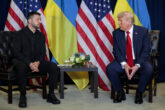August 12, 2019
The U.S. or China? Europe Needs to Pick a Side
Amid ten consecutive weeks of protest in Hong Kong, Beijing is looking to a seemingly unlikely place for support: Europe. In recent days, Chinese ambassadors across the continent have gone on the offensive to rally Europe behind Hong Kong’s government and against the protestors. As part of their campaign to promote Beijing’s line, China’s ambassadors are publishing op-eds in local papers and publicly criticizing European leaders for failing to denounce what they are trying to frame as violent protests. The audacity of China’s efforts suggests that in Beijing’s eyes, Europe is up for grabs.
There’s a reason China thinks Europe might be persuaded. As China attempts to spread its authoritarian values across the globe, and especially as the competition between China and the United States intensifies, Europe has conspicuously avoided siding with the United States over China. European leaders remain convinced they can uphold the values and norms they share with Washington while benefitting economically from greater engagement with China. This stance is short-sighted and dangerous—putting liberal democracy in peril.
China is a close and important partner for Europe; the two sides trade roughly 1 billion Euros worth per day, and Chinese foreign direct investment in the EU totaled 29.1 and 17.3 billion Euros in 2017 and 2018 respectively. The economic opportunity that China presents—especially for countries that have lagged economically behind Western Europe—creates strong incentives to sit on the fence. Countries in Southern and Eastern Europe in particular benefit from China’s Belt and Road investment and are keen to avoid losing it.
Read the full article in POLITICO Magazine.
More from CNAS
-
Transatlantic Security / Middle East Security
The Russia-Iran Partnership: A Geopolitical Balancing ActIt has been almost a year since Russia and Iran signed their comprehensive strategic partnership. That deal established a 20-year partnership between the two countries coverin...
By Andrea Kendall-Taylor & Jim Townsend
-
Defense / Transatlantic Security
Ukraine’s Catch-22 MomentThis article was originally published in the Financial Times. In Joseph Heller’s wartime classic, Catch-22, the protagonist Yossarian seeks out the US army surgeon Doc Daneeka...
By Franz-Stefan Gady
-
Transatlantic Security / Middle East Security / Energy, Economics & Security
Sanctions Aren’t Enough to Shut Down the Moscow-Tehran Black Market for WarThe geographic scope and extent of Iranian-Russian cooperation highlights the failure of traditional sanctions to prevent Moscow and Tehran from seeking key components like ch...
By Delaney Soliday
-
What’s Driving President Trump’s New Confidence in Ukraine’s War Effort
President Trump dramatically declared on social media that he now believes that Ukraine can reclaim all its land from Russia, which he described as a paper tiger. From the Ova...
By Richard Fontaine




